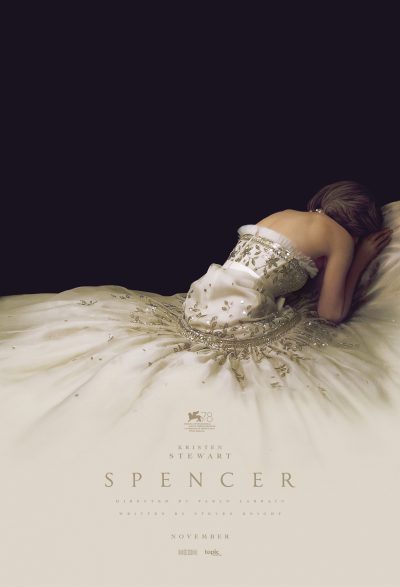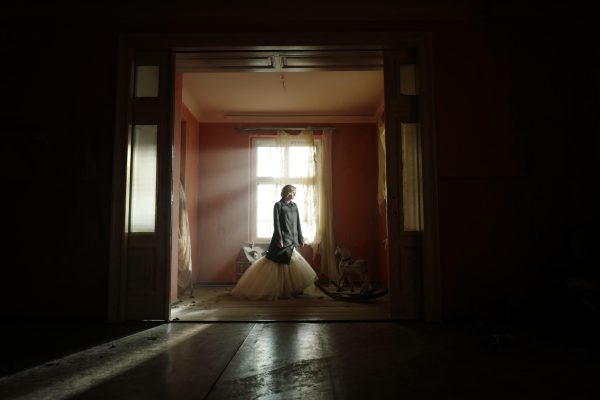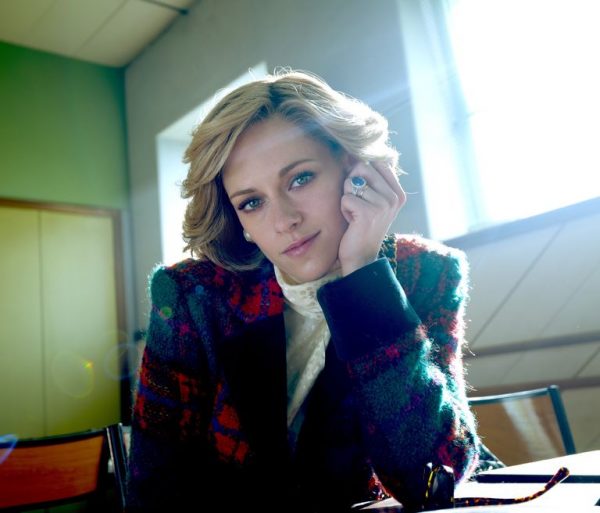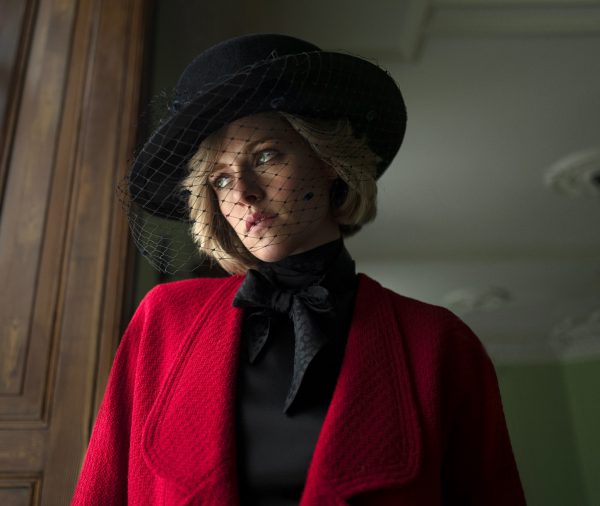
“Spencer” (2021). Cast: Kristen Stewart, Timothy Spall, Sally Hawkins, Jack Farthing, Jack Nielen, Freddie Spry, Sean Harris, Laura Benson, Stella Gonet, Richard Sammel, Lore Stefanek, Elizabeth Berrington, Amy Manson, Thomas Douglas, Kimia Schmidt, Emma Darwall-Smith, Greta Bücker. Director: Pablo Larraín. Screenplay: Steven Knight. Web site. Trailer.
Removing oneself from a difficult situation can be a challenging task. Numerous impediments can infringe on the process, not only making it difficult to execute, but even to launch. That prospect can be exacerbated even further for those in the public eye, their words and deeds scrutinized in virtually every detail. Consequently, transitioning out of such circumstances may be truly daunting, as illustrated in the new hypothetical historical drama, “Spencer.”
In talking about this film, there’s one important consideration to bear in mind up front: this is a work of speculative fiction involving real-life individuals, not a literal chronicle of historic events. From the very beginning of this picture, an electronic graphic in the lower corner of the screen refers to “Spencer” as a fable about a tragic truth. Thus viewers who expect something else out of this offering will be sorely disappointed. This is a caution that audiences ignore at their peril.
It’s 1991, a decade since the fairytale marriage of England’s Princess Diana (Kristen Stewart) and Prince Charles (Jack Farthing), heir apparent to the throne. Despite that romantic beginning, things have soured between them. Rumors of affairs, incessant quarreling between Charles and Diana, and disapproval of the Princess as a persistent complainer by the royal family have circulated widely, despite efforts to maintain a blissful, problem-free public façade. However, internal pressures have been mounting for some time, and it has taken quite a toll on the Princess, bringing her near a breaking point.
Challenges aside, the royal family has gathered at the Sandringham Estate of Queen Elizabeth II (Stella Gonet) for the Christmas holidays, a time during which all controversies have supposedly been declared off-limits in favor of three days of feasting, hunting and celebration. For Diana, however, merely attending the event is a strain on her composure, some might even say her sanity. For some time, she has largely bottled up her feelings, resulting in a stockpile of unexpressed anger and frustration. Her husband’s affair with Camilla Parker-Bowles (Emma Darwall-Smith), the never-ending expectations of meticulously fulfilling often-silly royal protocols and her own battles with eating disorders have left her exceedingly distraught. Add to that the disdain felt for her by her in-laws, and you’ve got an emotional time bomb waiting to explode.
Given how circumstances have been unfolding, Diana has begun to wonder what the future holds for her marriage and her place within the royal family. The Windsor clan suspects this, too, fearing that her “delusional” state of mind may cause her to go off the deep end, a concern that has prompted the appointment of long-trusted aide Maj. Alistair Gregory (Timothy Spall) to oversee the weekend’s festivities and to keep the rebel Princess in line. Because of this, however, Diana has come to resent this deliberate attempt at handling. She has even quietly pondered the possibility that she might – either metaphorically or literally – befall a fate not unlike that of Anne Boleyn (Amy Manson), one of King Henry VIII’s wives, who was executed when she fell into disfavor with the monarch – and who has now begun appearing in visions to the troubled Princess.

To compound matters, Sandringham is located next to the Spencer Estate, Diana’s now-shuttered childhood home, where she enjoyed many years as a fun-loving, carefree child (Kimia Schmidt) and teen (Greta Bücker). She desperately wants to visit the property, if for no other reason than to attempt to relive those fond memories. But, like so many of the other rigid restrictions placed upon her, she’s forbidden from going there due to the dangerous, rundown state of the manor house, yet another frustration that weighs heavily upon her.
This is not to suggest that Diana is without sources of comfort. For example, she relishes her time with her sons, William (Jack Nielen) and Harry (Freddie Spry), both of whom she positively adores (and vice versa). She also enjoys the company of two servants who serve as personal confidantes, her dresser, Maggie (Sally Hawkins), and the estate’s head chef, Darren (Sean Harris). She even develops a sort of arm’s-length rapport with Maj. Gregory, though, in true deferential fashion, he keeps a discreet distance, despite efforts to quietly look out for her best interests.
Over the course of the holidays, Diana’s interactions with these kindreds prove quite valuable, most notably in helping her retrieve, strengthen and develop her lost sense of personal power. She refuses to be kept captive by a thoroughly dysfunctional family, making her feelings known in deliberately defiant ways. More than that, though, she also refuses to allow herself to be held hostage by her own fears and apprehensions. She’s resolved to be herself, much as she was in her youth, free from the burdensome restrictions heaped upon her for the sake of appearances, to truly become the independent, self-determining individual she has always wanted to be. That may come at a high cost, but it’s what she needs if she’s to be at peace with herself and the future that awaits her.
To characterize Diana’s life as a tragedy, as the film’s opening graphic suggests, is, in some ways, an understatement. To be sure, her accomplishments for the betterment of humanity are undeniable. However, those achievements came about in a very public arena, one that often demanded much of her at a high personal cost. And, when she finally attained the independence she craved, her ability to enjoy it was cut short at an all-too-young age. Nevertheless, for what it’s worth, she successfully managed to realize it for a time by taking the requisite steps needed to reach that goal.
Specifically, this came about by significant adjustments in Diana’s beliefs, and that’s crucial given the role they play in the conscious creation process, the philosophy that maintains we draw upon these resources in manifesting the reality we experience. It’s not known whether Diana had ever heard of this school of thought, yet, as the experiences in this film illustrate, it’s apparent she learned how to make use of it to her benefit. And, considering what she was up against, that was no small order.

At the top of Diana’s list was a need to take back her personal power. The many demands placed on her were so daunting that she lost much of her ability to direct or control her fate. That loss, combined with the many extenuating distractions that burdened her, left her depleted and embittered. However, if Diana were to salvage a life for herself, she would have to refocus her beliefs to bring them into line with her wants and needs.
A number of components were part of this process. For starters, she needed to assert her desire to be her authentic self and to live her life with a sense of personal integrity. This meant following her heart and pursuing the free-spirited nature of her own wishes, not following the stuffy dictates of archaic practices and traditions, a maverick streak that ran afoul of her in-laws’ pompous sensibilities. By ignoring her own needs, she was suffocating under the weight of expectations that didn’t suit her. This stifling of her desires subsequently caused them to accumulate to a dangerous level, prompting them to emerge in an intense, exaggerated manner. It’s understandable why onlookers would be troubled by this. But it’s also understandable how this relentless build-up and denial of her true self negatively affected her. Change obviously had to come, and she wisely chose to make it happen.
To reach that point, though, she had to overcome the fears and limitations that were holding her back. These hindrances are themselves belief based, so those elements had to be altered as part of Diana’s personal transformation. Achieving this required a Herculean effort on her part, given how many forces were working against her. But, despite the many opposing factors, their presence also helped to steel her resolve, to push her in surmounting these fears and limitations to allow her true self to rise up and emerge.
With this piece of the puzzle in place, Diana was able to discern which aspects of her reality needed to be discarded. In particular, this meant leaving behind what no longer served her and embracing the aspects of life that enriched and fulfilled her existence. In some cases, that even called for willful acts of defiance to assure that she rid herself of what was now clearly expendable. This is quite a liberating experience for anyone, but it had to be especially gratifying for someone who was saddled with so much extraneous baggage on so many fronts.

Through all of this, Diana was wise enough to recognize that she required guidance in carrying out these plans, and, fortunately, she had many confidantes to draw upon in this regard. This was plainly obvious in her consultations with Maggie and Darren. But it also became apparent in her dealings with her sons, especially young Prince Harry, who, like his mother, could clearly see the writing on the wall where the royal family was concerned (which explains a lot when it comes to the real-life Prince’s very public and intentional disengagement with his relatives). These intimate discussions and interactions helped Diana determine what mattered most in life, giving her the power to make the necessary decisions and form the essential beliefs required to implement these changes for the better. And isn’t that something we all ultimately want for ourselves?
There’s a big difference between fable and chronicle, and that seems to be the point on which many viewers are misunderstanding this historic “what if” saga about one of the world’s best known and most celebrated icons. At a time when the storied marriage of Charles and Diana was quickly dissolving, we see a frazzled woman in transition, fighting to protect her own identity and the well-being of her children under the crushing weight of traditions and expectations that did not suit her. However, as this story unfolds, viewers see a side of the beloved People’s Princess that is not always the most flattering or in line with their impressions but nevertheless depicts her honestly as an authentic human being seeking to keep herself from being consumed by the toxic environment surrounding her. Director Pablo Larraín’s latest is thus more of a hypothetical character study, presenting events and situations where the kinds of issues Diana was experiencing are depicted despite a lack of verified substantiation. To be sure, some of those incidents are a little melodramatic, with symbolism that can be a trifle heavy-handed and obvious at times. Yet, when considered within the narrative context in which they’re included, it’s understandable why they were made part of the story. In this way, much of what the filmmaker has done here for Diana is similar to what he did for First Lady Jacqueline Kennedy in “Jackie” (2016), both pictures being about women who experienced tremendous tragedy in their lives and how they attempted to cope with their circumstances.
The crowning element of this film, of course, is the stellar performance of Kristen Stewart, a portrayal that easily makes clear why she’s currently the leading contender to win this year’s Oscar for best actress. But there are many other fine attributes here, too, from production design to costumes to an excellent supporting cast and more. This theatrical release reinforces filmmaker Pablo Larraín’s status as one of the best directors working in the business today. It’s indeed unfortunate that this offering has become so misunderstood in a number of circles, but it truly is one of this year’s finest, as long as viewers appreciate why it is the way it is.
The Princess of Wales was an inspiration for many. However, it’s often overlooked that she was also a real-life person, one with her own faults, challenges and needs. As a larger-than-life figure, though, many forget that individuals such as Diana are fundamentally much like the rest of us, and they deserve the right to engage in the kinds of personal pursuits we all readily enjoy. Making the transition from one’s public self to the private side of life might be challenging, but it’s a birthright we’re all entitled to enjoy, even when one is a princess. Diana may not have had much of an opportunity to fully savor such a possibility, but we can only hope that she enjoyed what she experienced – just as it should be for any of us.
Copyright © 2021, by Brent Marchant. All rights reserved.

No comments:
Post a Comment